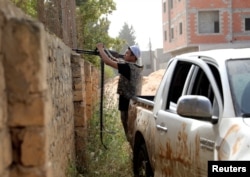Fighting for control of Libya between two rival governments is turning civilian neighborhoods into "battlegrounds," the International Committee of the Red Cross said Thursday.
"The humanitarian situation in and around Tripoli has deteriorated sharply over the past three weeks," the ICRC said. "Tripoli's basic services and infrastructure, such as hospitals and water pumping stations — which have already suffered from violence over the past eight years — are being weakened further."
The group said indiscriminate shelling was making it increasingly dangerous for medical workers to treat victims.
The United Nations estimates more than 35,000 people have fled their homes and are staying with relatives or hunkered down in public buildings.
U.N. officials evacuated 325 refugees from a government-run shelter after reports that some of the people living there had been attacked.
The Libyan government has asked the Security Council to send a team of experts to Tripoli to investigate alleged attacks on civilians.
Haftar blamed
Elmahdi Elmajerbi, Libya's U.N. ambassador, circulated a letter blaming the attacks on forces loyal to Gen. Khalifa Haftar, the Libyan strongman who has set up a government in the east and sent his fighters to try to take Tripoli from the internationally backed government of Prime Minister Fayez al-Sarraj.
The White House said President Donald Trump telephoned Haftar last week and talked about "a shared vision for Libya's transition to a stable, democratic political system."
Bloomberg News reported that several White House officials said Trump endorsed the general's assault on Tripoli and his efforts to try to take over the country.
Trump's alleged backing of Haftar would directly contradict Secretary of State Mike Pompeo's declaration earlier this month. Pompeo said the United States has "made it clear that we oppose the military offensive by Khalifa Haftar's forces and urge the immediate halt to these military operations against the Libyan capital."






